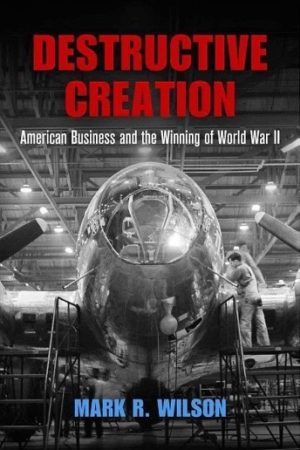Historian’s Book Offers Fresh Look at Business Role in World War II

During World War II, the United States transformed its massive economic capacities into military might, which proved critical to winning the war against the Axis powers. Producing nearly two-thirds of all the munitions used by Allied forces, the captains of American industry created what President Franklin D. Roosevelt called “the arsenal of democracy.”
In his acclaimed book, Destructive Creation: American Business and the Winning of World War II, research by UNC Charlotte history professor Mark Wilson offers a fresh and fascinating look. He has uncovered information in business and military records that shows not only cooperation, but also antagonism in the American business community to what was seen as over-reaching regulation by the wartime government. Industry responded with an aggressive campaign to tout their contributions while dismissing public-sector contributions.
“Destructive Creation is a truly important, impressive, and extraordinary history of the mobilization of the United States’ economy during the Second World War, with a number of fascinating implications for our understanding of the interactions between business, politics, and American society,” reviewer Jason Scott Smith of the University of New Mexico says. “Mark R. Wilson makes a compelling case for placing the relationship between the military and business at the center of how we think about modern American history.”
Wilson spent 10 years researching military and government archives and records of companies that made weapons for the war. His search led him to the records of Boeing Aircraft and Manufacturing, Ford Motor and DuPont U.S.
“The book offers an account of how the U.S. mobilized the economy to make supplies for the Allies to win World War II,” Wilson says. “It’s also a study of the political struggles on the home front over who should receive credit for success after mobilizing.”
In a call for “war” against climate change in a recent issue of New Republic, a journal of politics and culture, leading environmentalist Bill McKibben discusses Wilson’s mobilization model.
“I think what interested McKibben was that in World War II, the giant production regime wasn’t dominated by the private sector or financed by Wall Street,” Wilson says. “To a large extent it was done because of public entities that financed and regulated. This relates to the central argument of the book, about the nature of business-government relations in World War II. We need to better understand the historical record of what happened. There are two common accounts of what happened on the home front. One of those is mainly the celebration of business entrepreneurs and their production accomplishments.”
In contrast to this celebration, a different interpretive tradition was highly critical of business leaders and suggested industrialists were profiteering and manipulating the government to benefit companies.
“Neither (the celebration of entrepreneurship nor anti-business sentiments) is satisfactory; both fail to talk about the role of government and military,” Wilson says. Public actors working for military and civilian agencies were key in financing and supervising war efforts, he says.
“We need to better appreciate the ways the public sector has shaped and regulated the economy in ways that sometimes have very successful outcomes, as they did in World War II,” says Wilson, whose research interests include military and political history and the development of the military-industrial complex in the United States, from the 1950s to the early 21st century.
Destructive Creation: American Business and the Winning of World War II was published by the University of Pennsylvania Press in 2016.
Writer Leanna Pough contributed to this story.